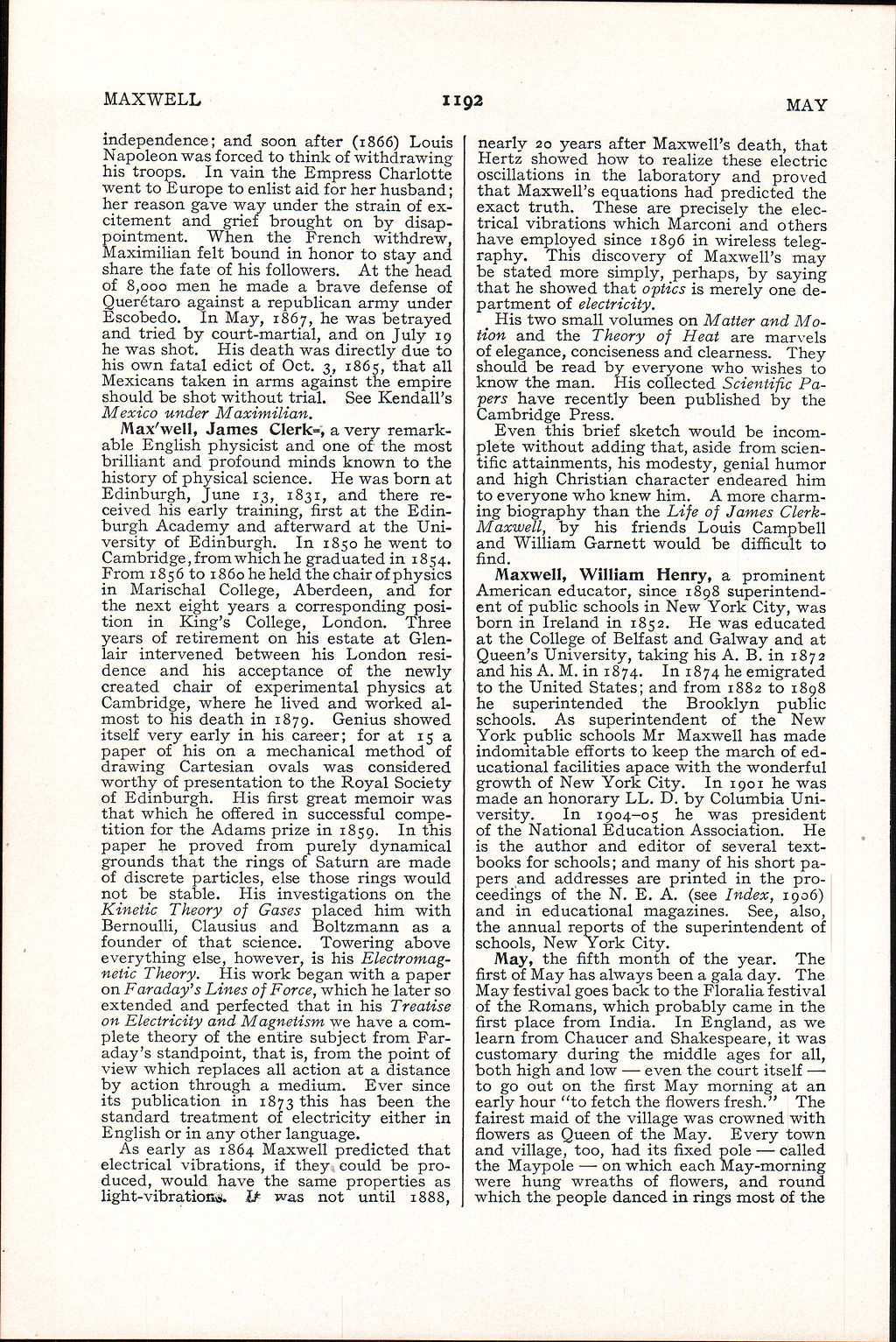independence; and soon after (1866) Louis Napoleon was forced to think of withdrawing his troops. In vain the Empress Charlotte went to Europe to enlist aid for her husband; her reason gave way under the strain of excitement and grief brought on by disappointment. When the French withdrew, Maximilian felt bound in honor to stay and share the fate of his followers. At the head of 8,000 men he made a brave defense of Querétaro against a republican army under Escobedo. In May, 1867, he was betrayed and tried by court-martial, and on July 19 he was shot. His death was directly due to his own fatal edict of Oct. 3, 1865, that all Mexicans taken in arms against the empire should be shot without trial. See Kendall’s Mexico under Maximilian.
Max′well, James Clerk-, a very remarkable English physicist and one of the most brilliant and profound minds known to the history of physical science. He was born at Edinburgh, June 13, 1831, and there received his early training, first at the Edinburgh Academy and afterward at the University of Edinburgh. In 1850 he went to Cambridge, from which he graduated in 1854. From 1856 to 1860 he held the chair of physics in Marischal College, Aberdeen, and for the next eight years a corresponding position in King’s College, London. Three years of retirement on his estate at Glenlair intervened between his London residence and his acceptance of the newly created chair of experimental physics at Cambridge, where he lived and worked almost to his death in 1879. Genius showed itself very early in his career; for at 15 a paper of his on a mechanical method of drawing Cartesian ovals was considered worthy of presentation to the Royal Society of Edinburgh. His first great memoir was that which he offered in successful competition for the Adams prize in 1859. In this paper he proved from purely dynamical grounds that the rings of Saturn are made of discrete particles, else those rings would not be stable. His investigations on the Kinetic Theory of Gases placed him with Bernoulli, Clausius and Boltzmann as a founder of that science. Towering above everything else, however, is his Electromagnetic Theory. His work began with a paper on Faraday’s Lines of Force, which he later so extended and perfected that in his Treatise on Electricity and Magnetism we have a complete theory of the entire subject from Faraday’s standpoint, that is, from the point of view which replaces all action at a distance by action through a medium. Ever since its publication in 1873 this n.as been the standard treatment of electricity either in English or in any other language.
As early as 1864 Maxwell predicted that electrical vibrations, if they could be produced, would have the same properties as light-vibrations. It was not until 1888, nearly 20 years after Maxwell’s death, that Hertz showed how to realize these electric oscillations in the laboratory and proved that Maxwell’s equations had predicted the exact truth. These are precisely the electrical vibrations which Marconi and others have employed since 1896 in wireless telegraphy. This discovery of Maxwell’s may be stated more simply, perhaps, by saying that he showed that optics is merely one department of electricity.
His two small volumes on Matter and Motion and the Theory of Heat are marvels of elegance, conciseness and clearness. They should be read by everyone who wishes to know the man. His collected Scientific Papers have recently been published by the Cambridge Press.
Even this brief sketch would be incomplete without adding that, aside from scientific attainments, his modesty, genial humor and high Christian character endeared him to everyone who knew him. A more charming biography than the Life of James Clerk-Maxwell, by his friends Louis Campbell and William Garnett would be difficult to find.
Maxwell, William Henry, a prominent American educator, since 1898 superintendent of public schools in New York City, was born in Ireland in 1852. He was educated at the College of Belfast and Galway and at Queen’s University, taking his A. B. in 1872 and his A. M. in 1874. In 1874 he emigrated to the United States; and from 1882 to 1898 he superintended the Brooklyn public schools. As superintendent of the New York public schools Mr Maxwell has made indomitable efforts to keep the march of educational facilities apace with the wonderful growth of New York City. In 1901 he was made an honorary LL. D. by Columbia University. In 1904–05 he was president of the National Education Association. He is the author and editor of several textbooks for schools; and many of his short papers and addresses are printed in the proceedings of the N. E. A. (see Index, 1906) and in educational magazines. See, also, the annual reports of the superintendent of schools, New York City.
May, the fifth month of the year. The first of May has always been a gala day. The May festival goes back to the Floralia festival of the Romans, which probably came in the first place from India. In England, as we learn from Chaucer and Shakespeare, it was customary during the middle ages for all, both high and low — even the court itself — to go out on the first May morning at an early hour “to fetch the flowers fresh.” The fairest maid of the village was crowned with flowers as Queen of the May. Every town and village, too, had its fixed pole — called the Maypole — on which each May-morning were hung wreaths of flowers, and round which the people danced in rings most of the
